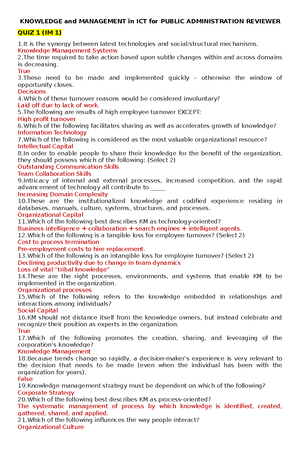- Information
- AI Chat
Was this document helpful?
NEW Right OR Government Oversupply Though
Course: Theory & Practice of Public Administration (PA 56)
458 Documents
Students shared 458 documents in this course
University: Aklan State University
Was this document helpful?

NEW RIGHT OR GOVERNMENT OVERSUPPLY THOUGH
The emergence of rational choice and public choice theory ushered in a new
understanding and concept of bureaucracy based on the sighting of the New Right theorists.
They believed that bureaucracy was simply inefficient and overly self-serving. As Heywood
(2002) conceptualized public choice theory in this respect: Public choice theory is a sub-field
of rational choice theory, based on the assumptions of neoclassical economics. Its central
assertion is that political issues are best analyzed by examining the behaviour of individuals
understood as rationally self-interested actors. The “public” character of public choice theory
stems from its concern with the provision of so-called public goods, goods that are delivered by
government rather than the market, because their benefit cannot be withheld from
individuals who choose not to contribute to their provision. Public choice theorists have
generally highlighted the failures and defects of government in this respect, focusing on issues
such as the impact of the bureaucracy on the policy process and the consequences of lobbying
and interest-group politics (p.276).
Meanwhile, rational choice theory postulates an individual as an abstract
model. It supports to overestimate human rationality in that it ignores the fact that
people seldom possess a clear set of preferred goals and rarely make decisions in the
light of full and accurate knowledge. Thus, leaving the government to assume and
presume what is best left for the constituencies to content with. (Lazo, 2009:17)
William Niskanen argued that senior bureaucrats regardless of their image as
public servants are primarily motivated by career self-interest and thus, seek an
expansion of the agency in which they work and an increase in its budgets. This is
because bureaucratic growth guarantees job security, expands promotion prospects,
improves salaries and brings top officials greater power, patronage and prestige. For
New Right advocates, they also believed that and quite simply, “unless bureaucratic
power can be checked or circumvented, any attempt to pursue free market policies is
doomed to failure.”
BUREAUCRACY AS A CIVIL SERVICE
Bureaucracy is also known as the civil service working in operation of the
“permanent” government. It is also engaged in a more theoretical way as a model for
organizing public administration. It is one way to organize public management in any
political system of this modern world. But the word bureaucracy is often used with a
negative or pejorative connotation of a red tape or general distaste. Hence, the duty of
a bureaucrat is to bring into practice policy guidelines or designed models into
concrete and workable cases. It is a procedure administration that facilitates an ideal
government to function with some degree of conformity, uniformity and predictability,





